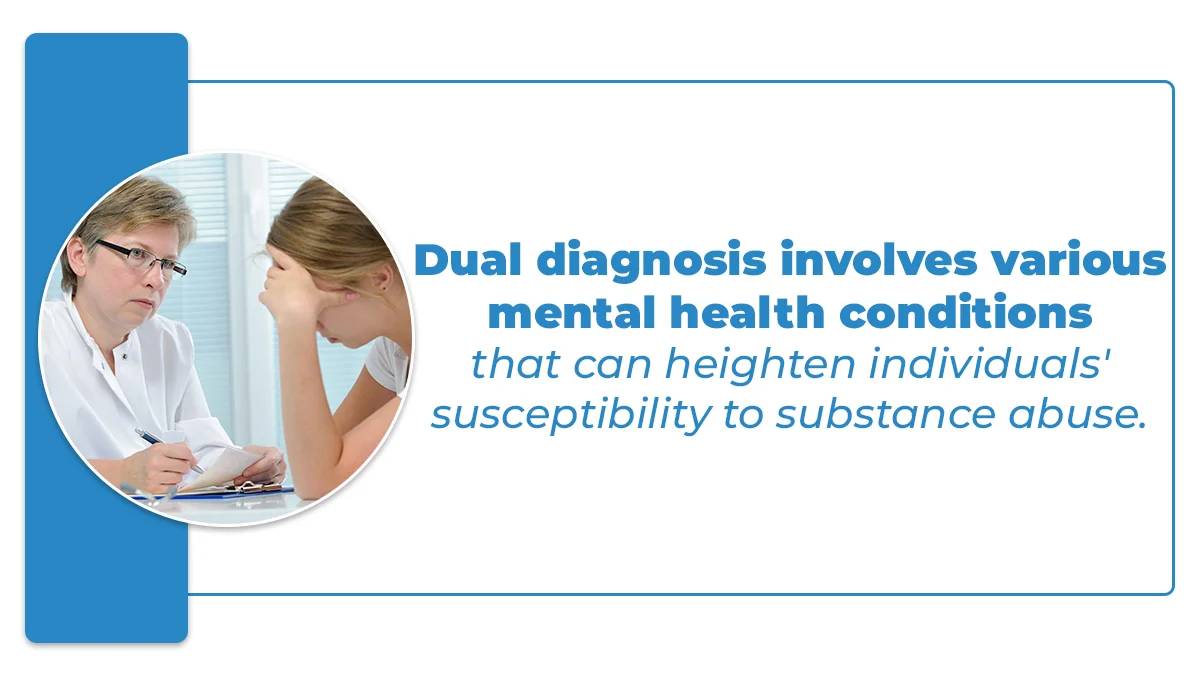
Effectiveness Of Medication-Assisted Treatment
Explore the effectiveness of medication-assisted treatment with The Recovery Team-Newton.

Dual diagnosis refers to the presence of both a mental health disorder and a substance use disorder in one person. This condition is common yet often complex. People with dual diagnosis face unique challenges. For instance, depression combined with alcohol dependency or anxiety coupled with opioid misuse can complicate treatment.
Effective care requires addressing both issues together. This article explores how seeking professional health can help individuals achieve better outcomes.
People facing a dual diagnosis encounter distinctive challenges that require attention and understanding. Here’s what you need to know:
The Recovery Team-Newton delivers specialized mental health and addiction care and offers personalized plans for sustained recovery. Call us at (508) 978-2772 for more information.
Dual diagnosis refers to the presence of both a mental health disorder and a substance use disorder within an individual. These conditions often interact, making each other worse. Examples include someone with depression who also struggles with alcohol abuse or someone with anxiety who misuses prescription drugs.
Dual diagnosis is common and requires special care. Treatment involves addressing both issues simultaneously, including therapy, medication, and support groups. Understanding dual diagnosis helps provide practical support and improve overall well-being. It’s vital to seek integrated care for the best outcomes in mental health and addiction recovery.
Treating dual diagnosis involves many challenges. It’s crucial to tackle both mental health and substance use disorders simultaneously. This requires a coordinated treatment plan. Often, one condition can mask or worsen the other, making diagnosis hard. Another challenge is the stigma around both mental health and substance use, which can prevent people from seeking help.
Additionally, finding the right combination of therapies and medications can be complex. Effective treatment needs ongoing support, including therapy, medication, and peer groups. Understanding these challenges is vital to providing comprehensive care for dual diagnosis.
Dual diagnosis often involves a combination of mental health disorders and substance use disorders. Frequently encountered mental health disorders comprise Major Depressive Disorder (MDD), anxiety disorders, bipolar disorder, and post-traumatic stress disorder (PTSD). These conditions can heighten individuals’ susceptibility to substance abuse, as they might turn to drugs or alcohol as a coping mechanism for their symptoms.
Major Depressive Disorder (MDD) is a common mental health condition characterized by persistent sadness, loss of interest in activities, and difficulty in daily functioning. Symptoms include changes in appetite, sleep disturbances, fatigue, and feelings of worthlessness or guilt. MDD affects millions of people in the United States each year, impacting their personal and professional lives.
Substance abuse encompasses the detrimental or risky utilization of psychoactive substances, which can include alcohol, prescription medications, and illicit drugs. Commonly abused substances include alcohol, opioids, stimulants (like cocaine and methamphetamine), and cannabis.
In the United States, opioid misuse has become a significant public health crisis, leading to high rates of addiction and overdose deaths. Patterns indicate rising rates of substance use among individuals with mental health disorders, underscoring the necessity for integrated treatment methodologies. Monitoring these trends helps in developing targeted interventions for those at risk.
Depression and substance use are often interconnected. Individuals with MDD may turn to substances as a way to self-medicate, temporarily alleviating their depressive symptoms. However, this can lead to a cycle of dependency, where substance use exacerbates depression, leading to increased use and further mental health decline. This vicious cycle can make treatment more challenging, as both conditions need to be addressed simultaneously.
Case studies illustrate the complexity of dual diagnosis. For example, a person with MDD might start drinking alcohol to cope with their sadness, eventually leading to alcohol dependency. In another case, someone using opioids for chronic pain may develop depression due to the effects of the drug and their life circumstances.
Bipolar Disorder is a mental health condition distinguished by dramatic mood fluctuations, encompassing manic (elevated energy) and depressive (decreased energy) episodes. During manic phases, individuals may feel overly happy, energetic, or irritable. In depressive phases, they may feel unfortunate, hopeless, or tired. These mood changes can affect daily life, relationships, and work.
People with Bipolar Disorder may misuse various substances, including alcohol, stimulants, and opioids. Alcohol is commonly used to self-medicate during depressive episodes. Stimulants, such as cocaine and amphetamines, might be used to prolong manic phases. Opioids can be abused to numb emotional pain during both manic and depressive episodes. The misuse of these substances can lead to dependency and worsen the symptoms of Bipolar Disorder, creating a complex treatment challenge.
There is a strong link between bipolar episodes and substance use. During manic episodes, impulsivity and risk-taking behaviors can lead to experimenting with drugs and alcohol. Individuals experiencing depressive episodes may resort to substance use as a means of managing emotions such as sadness and hopelessness. This pattern of behavior can exacerbate both the bipolar symptoms and the substance use disorder, making it essential to address both conditions in treatment.
Real-life examples highlight the complexity of dual diagnosis with Bipolar Disorder. For instance, someone in a manic phase might engage in heavy drinking to sustain their high energy levels, eventually leading to alcohol dependency. Another person might use opioids during depressive phases to escape emotional pain, resulting in addiction.
Anxiety disorders include conditions such as Generalized Anxiety Disorder (GAD), Panic Disorder, and Social Anxiety Disorder. GAD involves excessive worry about everyday events. Panic Disorder is characterized by sudden, intense fear and physical symptoms like a racing heart. Social Anxiety Disorder involves intense fear of social situations and being judged. These conditions can severely impact daily life and relationships.
Individuals with anxiety disorders may misuse substances like alcohol, benzodiazepines, and marijuana. Alcohol is often used to reduce social anxiety and calm nerves. Benzodiazepines, such as Xanax and Valium, are prescribed for anxiety but can be misused for their calming effects. Marijuana is sometimes used to relax and reduce stress.
Anxiety can significantly influence substance use patterns. Individuals may turn to substances as a form of self-medication to temporarily relieve their anxiety symptoms. This can lead to a cycle where the temporary relief from substance use is followed by increased anxiety, prompting further use. Over time, this pattern can develop into a substance use disorder, complicating the treatment of the anxiety disorder.
For example, someone with Social Anxiety Disorder might start drinking alcohol before social events to feel more relaxed, eventually leading to alcohol dependency. Another person with Panic Disorder might misuse benzodiazepines to prevent panic attacks, resulting in addiction. These cases highlight the need for comprehensive treatment plans that address both anxiety and substance use.
Schizophrenia is a severe mental health condition that impacts an individual’s cognition, emotions, and actions. Symptoms encompass hallucinations (perceiving or hearing nonexistent stimuli), delusions (holding false beliefs), disorganized thinking, and diminished functionality. These symptoms can make everyday life challenging. Schizophrenia typically requires long-term treatment, including medication and therapy, to manage symptoms and improve quality of life.
People with schizophrenia often misuse substances such as alcohol, nicotine, and cannabis. Alcohol may be used to self-medicate and reduce anxiety or stress. Nicotine is commonly abused for its temporary calming effects. Cannabis is sometimes used to manage symptoms but can exacerbate psychosis. These substances can worsen schizophrenia symptoms and lead to dependency, making treatment more complex.
Substance abuse can trigger or worsen schizophrenic episodes, creating a vicious cycle. For instance, using cannabis can increase the risk of psychotic episodes. Alcohol and drug use can interfere with schizophrenia medications, reducing their effectiveness. This cycle of substance use and worsening mental health symptoms makes recovery challenging. Integrated treatment addressing both schizophrenia and substance use is essential for breaking this cycle and improving outcomes.
For example, a person with schizophrenia might use alcohol to cope with hallucinations, leading to alcohol dependency and more frequent psychotic episodes. Another individual might use cannabis to manage stress but experience heightened paranoia and delusions. These real-life examples show the importance of comprehensive treatment plans that address both schizophrenia and substance use.
Post-traumatic stress disorder (PTSD) emerges as a mental health condition after experiencing or witnessing a traumatic event. Manifestations encompass flashbacks, nightmares, intense anxiety, and persistent intrusive thoughts regarding the event. These symptoms can significantly disrupt daily functioning and impede daily life.
People grappling with PTSD often resort to substances such as alcohol, opioids, and benzodiazepines. Alcohol is commonly sought to dull emotional pain and anxiety, while opioids are usually abused for their soothing effects and as a means to evade traumatic memories. Benzodiazepines, prescribed for anxiety, can be abused to alleviate severe anxiety and stress. Misusing these substances can lead to dependency and worsen PTSD symptoms.
Self-medication is common in people with PTSD. They may use substances to relieve their distressing symptoms temporarily. This can create a cycle where the initial relief leads to increased use, ultimately exacerbating PTSD symptoms and causing substance dependency. Addressing both PTSD and substance abuse in treatment is crucial for breaking this cycle and achieving effective recovery.
For example, a veteran with PTSD might use alcohol to cope with flashbacks, leading to alcohol dependency and increased symptoms. Another individual might misuse opioids to avoid traumatic memories, resulting in addiction. These real-life scenarios underscore the significance of integrated treatment plans that tackle both PTSD and substance use disorders.
In addressing dual diagnosis, a comprehensive approach to treatment is imperative, considering the intricate interplay between mental health disorders and substance use. Integrated strategies encompass various plans, offering hope for individuals grappling with co-occurring conditions.
Integrated treatment merges mental health and substance abuse services to effectively address co-occurring disorders. Benefits include improved outcomes, reduced relapse rates, and better overall functioning. Successful integrated programs, like the Matrix and Dual Diagnosis Capability in Addiction Treatment (DDCAT) models, offer comprehensive care tailored to individual needs.
Cognitive Behavioral Therapy (CBT) helps individuals identify and change harmful thought patterns and behaviors. Motivational Interviewing fosters a space for clients to delve into their mixed feelings about change while boosting motivation for their journey toward recovery. Peer support groups, like Alcoholics Anonymous (AA) and Narcotics Anonymous (NA), provide encouragement and understanding.
Medications prescribed for mental health disorders, like antidepressants and antipsychotics, assist in easing symptoms. Medications for substance abuse, like buprenorphine for opioid addiction, can reduce cravings and withdrawal symptoms. Healthcare providers prescribe these medications based on individual needs and circumstances.
Tailoring treatment to individual needs ensures the most effective outcomes. Tailored plans may encompass therapy, medication, and supportive services. By addressing specific symptoms and risk factors, personalized treatment enhances recovery and reduces the likelihood of relapse.
These approaches offer comprehensive care for individuals with mental health and substance abuse disorders. Integrated treatment models, behavioral therapies, pharmacological interventions, and personalized plans help address the complex needs of those with co-occurring disorders, promoting long-term recovery and improved quality of life.
Common medications for dual diagnosis include antidepressants, antipsychotics, mood stabilizers, and medications to manage substance use disorders. These medications treat symptoms of mental illness and substance abuse, helping individuals achieve stability and recovery. Researchers and the National Institute recommend an integrated approach, combining medication with therapy for best results.
Dual-diagnosis treatment programs often incorporate medication management as a critical component. Family members play a crucial role in supporting medication adherence. Initiating mental health services marks the initial stride toward achieving effective treatment. Group therapy provides additional support for those with dual diagnosis.
Diagnosing dual diagnosis presents challenges due to overlapping symptoms of mental disorders and substance abuse. Identifying specific mental health issues amidst drug abuse can be complex. Family members may not recognize signs impacting treatment centers. An integrated treatment approach is crucial but often underutilized. Limited research complicates understanding.
Suicidal thoughts and severe symptoms may overshadow personality disorders. Identifying patients with dual diagnosis requires a thorough examination of their history. National surveys have highlighted an increased risk in these cases. The absence of treatment programs for dual diagnosis is hindering proper care. Addressing the needs of individuals with dual diagnosis requires collaboration, and recognizing common symptoms can ensure timely intervention.
At The Recovery Team-Newton, we understand the complexities of addressing both mental health and addiction challenges, providing comprehensive solutions tailored to your unique needs.
Our specialized dual diagnosis treatment incorporates medication-assisted treatment, utilizing medications like buprenorphine to manage cravings and withdrawal symptoms while promoting stability and recovery. Additionally, With our day treatment program, individuals receive personalized support and therapy sessions designed to address both mental health disorders and substance abuse.
Don’t hesitate to take the first step towards healing. For more information, contact us at (508) 978-2772.

Explore the effectiveness of medication-assisted treatment with The Recovery Team-Newton.

Explore how long drug rehab programs are with the complete guide from The Recovery Team-Newton.

How much does drug rehab cost without insurance? The Recovery Team-Newton explains financing options and resources.